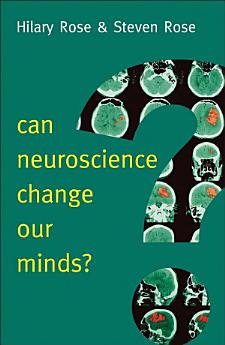Can Neuroscience Change Our Minds?
2016年9月 · John Wiley & Sons
4.5star
2条评价report
电子书
176
页
report评分和评价未经验证 了解详情
关于此电子书
Neuroscience, with its astounding new technologies, is uncovering the workings of the brain and with this perhaps the mind. The 'neuro' prefix spills out into every area of life, from neuroaesthetics to neuroeconomics, neurogastronomy and neuroeducation. With its promise to cure physical and social ills, government sees neuroscience as a tool to increase the 'mental capital' of the children of the deprived and workless. It sets aside intensifying poverty and inequality, instead claiming that basing children's rearing and education on brain science will transform both the child's and the nation's health and wealth.
Leading critic of such neuropretensions, neuroscientist Steven Rose and sociologist of science Hilary Rose take a sceptical look at these claims and the science underlying them, sifting out the sensible from the snake oil. Examining the ways in which science is shaped by and shapes the political economy of neoliberalism, they argue that neuroscience on its own is not able to bear the weight of these hopes.
Leading critic of such neuropretensions, neuroscientist Steven Rose and sociologist of science Hilary Rose take a sceptical look at these claims and the science underlying them, sifting out the sensible from the snake oil. Examining the ways in which science is shaped by and shapes the political economy of neoliberalism, they argue that neuroscience on its own is not able to bear the weight of these hopes.
评分和评价
4.5
2条评价
作者简介
Hilary Rose is Emerita Professor of Social Policy at the University of Bradford. Together with Steven Rose, she is author of "Genes, Cells and Brains" and "Alas, Poor Darwin".
Steven Rose is Emeritus Professor of Neuroscience at The Open University. He was co-founder of the British Neuroscience Association, and has won numerous prestigious awards, including the Biochemical Society medal for communication in science and the British Neuroscience Association's lifetime award for "Outstanding contributions to neuroscience".
为此电子书评分
欢迎向我们提供反馈意见。
如何阅读
智能手机和平板电脑
笔记本电脑和台式机
您可以使用计算机的网络浏览器聆听您在 Google Play 购买的有声读物。
电子阅读器和其他设备
如果要在 Kobo 电子阅读器等电子墨水屏设备上阅读,您需要下载一个文件,并将其传输到相应设备上。若要将文件传输到受支持的电子阅读器上,请按帮助中心内的详细说明操作。




